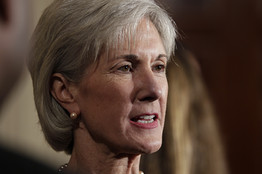ObamaCare Rewards Friends, Punishes Enemies
The administration waives allies through the health law's onerous restrictions.
By
KARL ROVE
WSJ.com
A primary task for the new Republican House majority is to undo as many of the pernicious effects of ObamaCare that it can. One of these effects is the spectacle of employers going hat-in-hand to the Department of Health and Human Services (HHS) for waivers from some of the law's more onerous provisions.
In September, HHS Secretary Kathleen Sebelius began granting waivers to companies that provided workers "mini-med" coverage—low-cost plans with low annual limits on what the insurance will pay out. This followed announcements by some employers that they would have to drop these plans because they did not meet the new health law's requirement that 85% of premium income be spent on medical expenses.
By early December, HHS had granted 222 such waivers to provide mini-med policies for companies including AMF Bowling and Universal Forest Product, as well as 43 union organizations. According to the department's website, the waivers cover 1,507,418 employees, of which more than a third (525,898) are union members. Yet unionized workers make up only 7% of the private work force. Whatever is going on here, a disproportionately high number of waivers are being granted to administration allies.
Then, on Dec. 21, Ms. Sebelius announced that insurance companies seeking rate increases of 10% or more in the individual or small group market must publicly justify the hikes under standards set by her department.
Insurance regulation has traditionally been a state responsibility, and 43 states must already approve proposed insurance-rate increases. ObamaCare does not authorize HHS to deny rate increases, but the agency said that if a state "lacks the resources or authority" to conduct the kind of review the agency wants, it will conduct its own.
This proposed regulation will erode the states' dominant role in insurance regulation, centralizing more power in Washington. The HHS announcement also mentioned that it will set different thresholds of what constitutes an "unreasonable" increase for every state by 2012.
The Obama administration's behavior to date suggests that it will not hesitate to take care of its friends. The Senate Republican Policy Committee's health policy analyst, Chris Jacobs, points out that the administration has already given an extravagant gift to the AARP (American Association of Retired Persons), a key player in passing the Patient Protection and Affordable Care Act.
The AARP provided a big chunk of the $121 million spent on ads supporting the bill's passage, as well as $21 million on lobbying in 2009, according to the Center for Responsive Politics. HHS's proposed regulations on Dec. 21 exempted the AARP's lucrative "Medigap" plans from the rate review and other mandates and requirements.
The AARP and other Medigap providers can require a waiting period before seniors with pre-existing conditions have to be covered. Insurers covering those under 65 cannot.
The AARP is also exempt from the new law's $500,000 cap on executive compensation for insurance executives. (The nonprofit's last CEO received over $1.5 million in compensation in his last full year, 2009.) It won't pay any of the estimated $14 billion in new taxes on insurance companies, though according to its 2008 consolidated financial statement, it gets more money from its insurance offerings than it does from dues, grants and private contributions combined. Nor will it have to spend at least 85% of its Medigap premium dollars on medical claims, as Medicare Advantage plans must do; the AARP will be held to a far less restrictive 65%.
It's not hard to connect the dots. The Obama administration is using waivers to reward friends. On the flip side, business executives will be discouraged from contributing to the president's opponents or from taking any other steps that might upset the White House or its political appointees at HHS.
This is not what people had in mind when candidate Obama promised in his acceptance speech in August 2008 to undo "the cynicism we all have about government."
In a speech at the University of Iowa last March, the president heralded health-care reform as "a new set of rules that treats everybody honestly and treats everybody fairly." Determining whether that is true will be another task for House Republicans. They have an obligation to look into this matter, and Mr. Obama can hardly object. It was former Supreme Court Justice Louis Brandeis, whom the president frequently quotes, who wrote in 1913 that sunlight "is the best of disinfectants."
Mr. Rove is the former senior adviser and deputy chief of staff to President George W. Bush.


